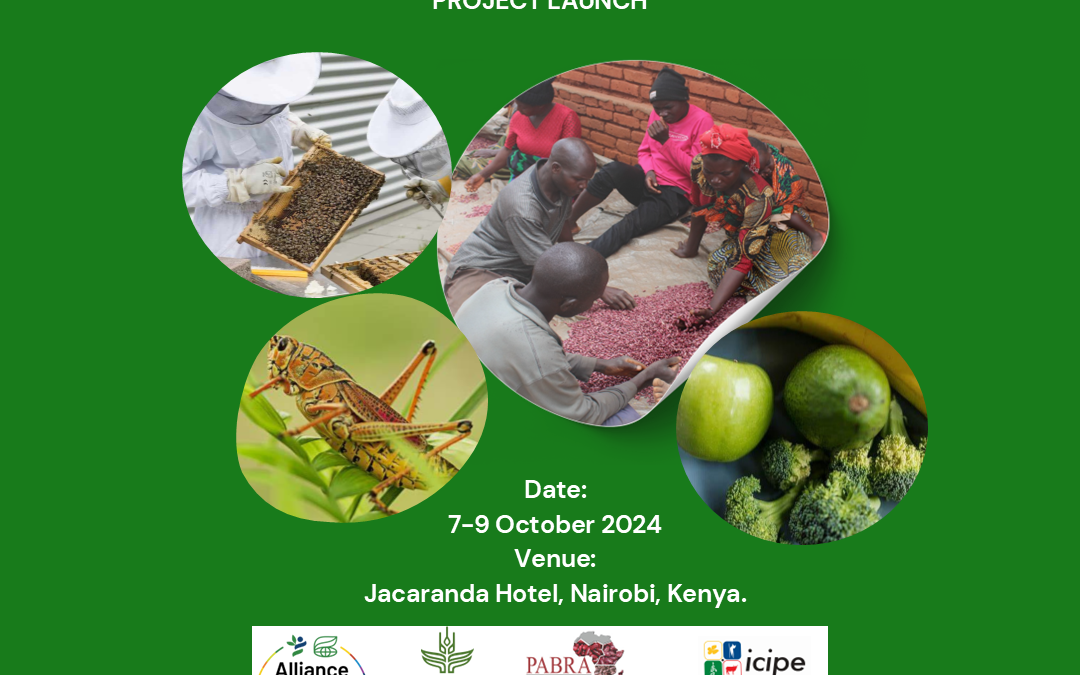From 7 to 9 October 2024, the Alliance of Biodiversity International and CIAT (The Alliance) through Pan-African Bean Research Alliance (PABRA) and the International Centre of Insect Physiology and Ecology (icipe) will launch the “Building Equitable Climate-Resilient African Bean and INsect Sectors (BRAINS) initiative”.
The project is supported by the Government of Canada through a CAD $20 million grant to the Alliance and icipe, to develop low carbon, climate resilient systems, that are favourable to women and the youth, using bean, fruit trees and beneficial insects farming and business enterprises.
The initiative will be implemented in 15 sub-Saharan African countries, while promoting low-carbon, climate-resilient agricultural systems, with emphasis focuses on empowering millions of farmers and value chain actors—especially women and youth—through the cultivation and business development of beans, fruit trees, and beneficial insects.
BRAINS will engage 5,000 changes agents, which in turn will directly benefit 10 million (60% being women) individual beneficiaries. These include 5 million smallholder farmers, 5 million consumers and school-age children, and a range of value chain actors. The project will also catalyse the growth of 2000 small and medium enterprises, while also indirectly supporting 50 million consumers, businesses, and households.
Jean Claude Rubyogo, Global Bean Leader and PABRA Director is excited to kick off this initiative across 15 Sub-Saharan countries, while also appreciating the great contributions of the Government of Canada and PABRA member countries.
“In Africa, beans are more than just a staple food—they are a lifeline for millions of families, providing essential food nutrients and supporting livelihoods. Despite appropriate innovations, bean production still faces increasing challenges, from pests and climate change to limited access to improved varieties. One option to increase farmers’ resilience in face of climate change is diversifying their production and provide multiple production and livelihood options. icipe, on the other hand, offers cutting-edge solutions for pest management and optimizing the ecological benefits of insects. This new collaboration between icipe and the Alliance/PABRA signifies our commitment to a partnership driven by a bold vision: to advance and harness bean research and insect ecosystems to create more resilient, nutritious, and sustainable agricultural systems,” explained Rubyogo.
Sunday Ekesi, icipe interim Deputy Director General, responsible for Research and Partnerships, shared similar sentiments.
“The BRAINS partnership will co-develop demand-led, climate-adapted bean varieties and fruit trees, primarily mango and avocado, supported by environmentally friendly pest and disease management options; organic soil fertility enhancement, through insect-based frass biofertilisers; and enhanced pollination services by the bees. Moreover, beans enhance nitrogen fixation and soil enrichment; fruit trees and beekeeping-friendly trees are perennial and drought-tolerant, thus helping to protect landscapes, restore soil function and fertility, and helping in carbon sequestration,” said Ekesi.
The BRAINS project will directly benefit 10 million people, 60% of them women and girls, and indirectly, an additional 50 million. The initiative will place smallholder farmers at the centre of innovation, encouraging them to adopt and adapt these new technologies, with training programmes to be held to ensure that farmers integrate sustainable insect-based solutions with improved bean production.
Among other activities lined up for the launch in Kenya’s capital, participants will be treated to a panel discussion featuring various guest speakers on various topics related to the current situation and transformative impact of BRAINS in Kenya, Uganda, Tanzania, Rwanda, Burundi, Zambia, Ethiopia, Zimbabwe, Malawi, Mozambique, Madagascar, Cameroon, Ghana, Guinea and Democratic Republic of Congo.

